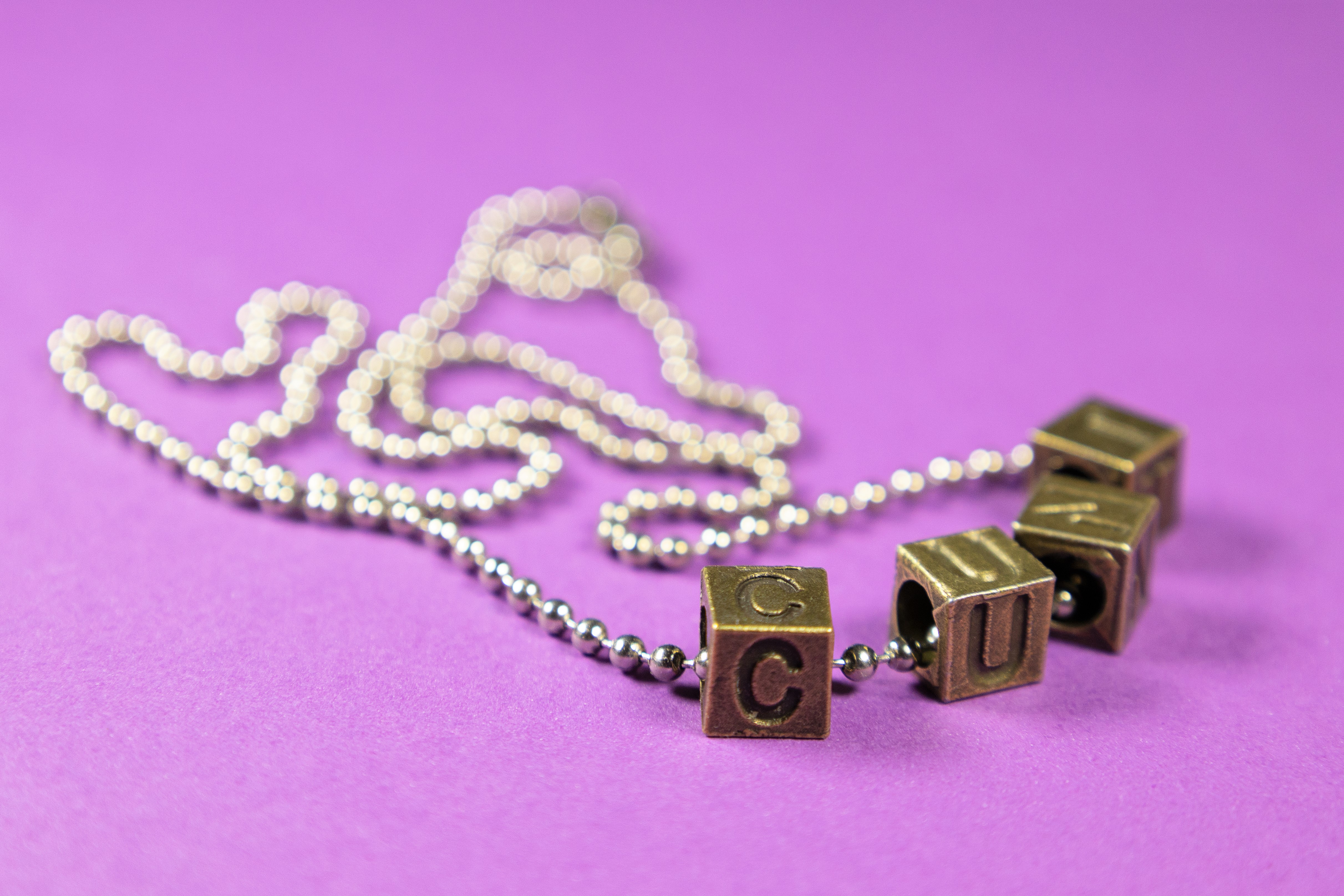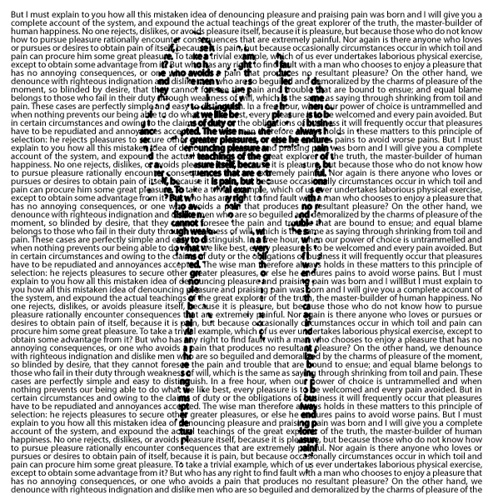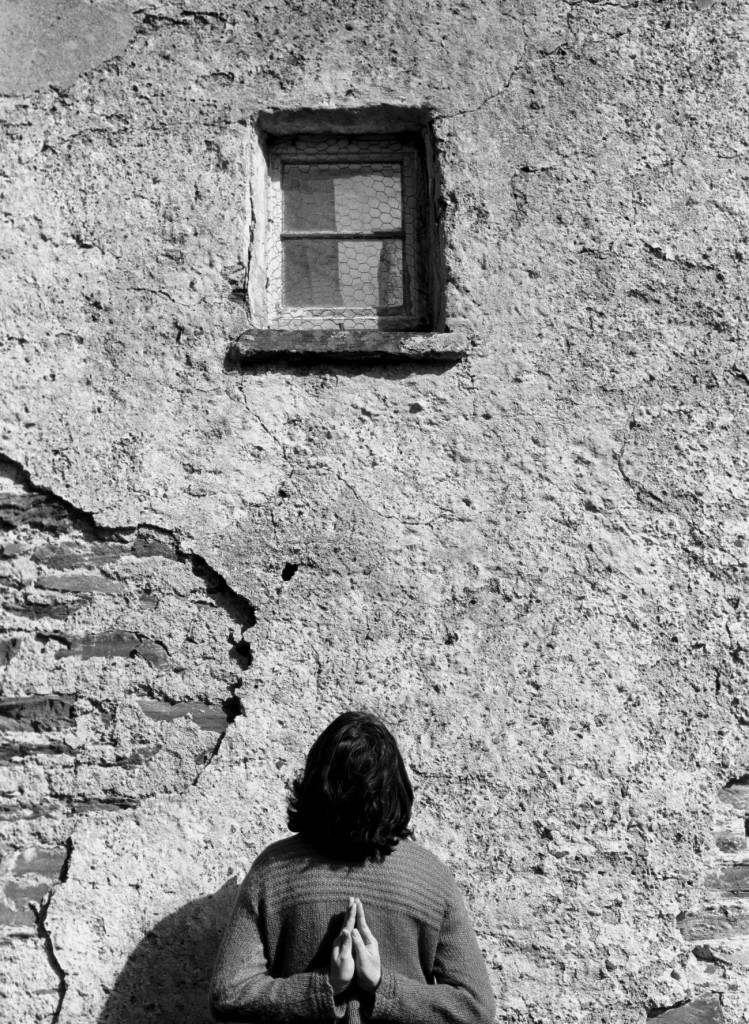
By Brooke Champagne
I tell you this
Is what I love about America—the words it puts
In my mouth…
—Heather McHugh, “I Knew I’d Sing”
I haven’t always known exactly what a cocksucking motherfucker was, or why my father knew so many of them. But from the time I was still feeding from my mother’s tit, I heard my father’s tits, shit, asshole and fuck more frequently than “I love you.” Though to be fair, cursing is like a love language in New Orleans, where I grew up. Son of a bitch is just the sound of coming home. Not everyone raised in the city talks this way, but few would look at you sideways if you did.
As an adult, I only look at someone sideways when, after talking for some time, I realize they haven’t used a single curse. What the fuck is wrong with you? I want to ask. Yet because I’m a woman of color, I’ve also learned to carefully calibrate my swearing, especially among those I don’t know well. I can’t drop a “cunt” on an English department colleague after we’ve finished chatting about the weather, for example. Even if I’ve just scrolled through Twitter, and a “cunt” is sorely needed. I live in the Deep South and am aware that the language that comes most naturally to me is generally considered deplorable, or un-academic, or the work of the devil. So I love my swearing, and my swearing is a constant worry.
Because my father worked as a ship’s steward in the years before Hurricane Katrina, where shipmates spent lots of time imagining aloud the elaborate uses for the end of mop handles on an all-male deck, and because he’s a man, the thought of apologizing for his language has never occurred to him. My whole life he’s abused the English language in the most glorious ways. Goddamn evil Republican sons of bitches. (Republican-led Congress voted on a tax break for the wealthy and balked on economic aid for the poor and middle classes.). Fat sonofabitching fuck, go eat your damn pancakes. (Chris Christie on Meet the Press.) Get off the stage, you Willie Nelson-looking cunty bastard. (This one was for Madonna, for daring to perform into her sixties, no longer as young and beautiful as she once was.) All of these responses reveal an irascible old man at his linguistic worst. But he doesn’t really mean the meanness, so much as he needs to say the curse.
I hate my father’s language for its misogyny, its political effrontery, its callousness for humanity. Yet I love it because despite myself, dammit, he makes me laugh. He once told me that if his doctor ever advised him to quit drinking for good, “I’d kill myself dead right inside the dickhead’s office.” My father’s father died of cirrhosis in his fifties, and while wasting away in the hospital, he begged for liquor to be transmitted through an IV, and the story goes that someone snuck in a flask now and again to help calm him.
My father claims to never feel sad or existentially low; he just calls me and curses about real and imagined infractions by a wide range of bastards, regarding people either televised or in the flesh. Research cited in Katherine Dunn’s On Cussing confirms that swearing helps us deal with pain. Though her example refers to physical suffering—studies show that people immersing hands in ice water can endure it longer if they curse aloud—I believe this applies to emotional distress, too. My father’s stories and the curses that comprise them—negotiating with cocksuckers, most often—are all the therapy he needs.
•••
For most of my life it’s been “like father, like daughter” in the language arena, but for a while I’ve felt I should curb my enthusiasm for swearing. For one, my daughter attends an Episcopal preschool where they expect some propriety. One morning a couple years ago, her teacher approached my passenger window to chit-chat while I waited in the pick-up line. I asked how she’d behaved that day because, “Her sleep last night was for shit.” The teacher’s face crumpled like loose-leaf, and she responded more to the car door than me. “You sure do put it out there! You don’t mince words!” I mean, she’s right, I don’t, but I didn’t see anything particularly off-color about what I’d said. What’s a little “shit” between two adults?
“Oh. Haha,” I said. “So, was she okay?” The teacher said that my daughter had performed her routine number of breakdowns. My next few sentences emerged, linguistically, in the vein of Mary Poppins. “How terribly unfortunate! She behaves abominably when she sleeps poorly.” People who balk at my natural inclination for expression make me quite literally unlike myself. I regretted that “shit” slip for weeks. I can’t imagine what the teacher would think about my ration of “cunts” per day, particularly during an election season.
Which is a forever-season in twenty-four-hour-news-cycle American politics, and which reminds me that our most recent ex-president bragged on tape about how much he enjoys grabbing women by the pussy. Because, if you recall, they let him do it. Yet he was elected in spite of (because of?) this revelation. More than seventy percent of American evangelicals let him do it, too, since they voted him into office and, even at the end of the most deranged, debased presidency in modern history, a majority of them still supported him. I understand they’re experiencing cognitive dissonance, they believe he’s an imperfect conduit of God, etc. etc., but you have to lean on that magical thinking pretty hard with this particular asshole.
But I have another theory about why they allowed themselves to ignore the “pussy” talk. According to Melissa Mohr’s Holy Shit: A Brief History of Swearing, curse words can historically be divided into two main areas of taboo: the Holy (religion-oriented curses) and the Shit (swears involving the human body). Yet in the past few decades, a new taboo swear category emerged in the racial epithet. My guess is that even though the religious right dislikes the ex-president’s vulgarity, they can abide Shit/body-type curses, even those rife with misogyny, that have become generally less taboo across culture. However, if he were known to have used a racial slur that has become increasingly off limits, even Senator McConnell might not allow the president to grab him by the pussy.
This begs the question of which we’d consider worse—the former president’s long history of blatant racism in the form housing discrimination, the call for execution of the Central Park Five, the demand for the birth certificate of the first Black U.S. President, the Brown children his administration locked in cages at our country’s border with Mexico, on and fucking on—or, if we could find a shorthand moment of him speaking a single slur that would finally “prove” his racism. In our culture, despite what we believe about ourselves, despite what we purport to teach our children, words speak louder than actions.
Surely recordings of Trump’s racial epithets exist. Right? Insiders say he swears more frequently than those around him, limited vocabulary that he has. One story from Michael Wolff’s book on his presidency, Siege, recounts a rumor that somewhere in fourteen years of behind-the-scenes Apprentice footage, one contestant says the word “cunt,” and another admonishes him, “You can’t say ‘cunt’ on TV.” To which the big D responds, “Cunt, cunt, cunt, cunt. There, I’ve said it on TV.”
I wonder what the public response would be if a woman running for higher office was rumored to ever have spoken the word “cunt.” In the 1990s, Hillary Clinton said “cookies” in a context that many found insulting to the real women of America and has been castigated for it ever since.
Anyway, add this man’s legacy, language, and lunacy to the reasons why I’m giving up on the curse. Or trying to.
Because while it’s okay for me to occasionally “shit” on my daughter’s teacher, if the teacher’s okay with it, it’s not okay for my daughter to do so. Several years ago, before my daughter was born, my husband and I visited my then-two-year-old niece in Baltimore. She was just learning to talk and wanted to tell us about a character in her favorite cartoon, some mouse who sounded like a dick.
“He’s not nice,” she told us. “He’s so … fucking.”
“He’s so what?” asked my husband, making sure he’d heard her right.
“He’s so fucking!”
“He’s so what?”
This back-and-forth continued a few more times, both because we were both trying to parse her sentence construction, waiting for the “fucking” modifier to be followed by a noun, but also because cursing toddlers are hilarious. The exception is when the toddler is your own. Because in that case, you’re complicit in raising a feral child. Who wants to deal with the fallout of a kid who says to their teacher, “I don’t want to play outside, fucker—I want to draw!”
Hearing my niece curse reminded me of an apocryphal story my mother loves telling about linguistically-innocent kindergarten me. One day I returned from school in hysterics because a boy on the bus called me a name. No, I could not repeat the word, it was too terrible; I only admitted it was “the j-word.” My mother ticked down the list of possibilities. Did he call me a jerk? A jagoff? A … jackass?
“The last one, that’s it!” I said, weeping into her arms.
But my mother wouldn’t let it go there. “Did you say something that made him upset? Why did he call you that?”
“No reason!” I insisted. “I only called him ‘motherfucker.’”
My mother stifled a laugh and explained that this was one of the worst “bad” words. “You should never say that at school, or ever, really.”
“Then why do you,” I said, flatly.
It’s a cute enough story. Again, any curse from a child’s mouth is inherently funny since they can’t yet comprehend its implications. It’s the provenance of my own cursing life, that it all started with that harmless little “motherfucker.”
But the more I’ve thought about it, the more cloying and untrue the story seems. Not that my mother is lying. I just can’t understand in what context I’d call someone a “motherfucker,” a word I’d heard her use in annoyance or anger, and expect anything other than an offended response. Clearly he’d pissed me off, so I called him a word matching that feeling. Did my child’s mind read his “jackass” response, one I probably hadn’t heard used much due its candy-assed nature, as the real dialectical dagger, since it was unfamiliar? Did the utility I’d witnessed in both my parents’ “motherfuckers” make them benign? My father spat it out constantly while traversing New Orleans traffic when he picked me up for the weekend, and it seemed to relieve his anger. I knew if he was calling someone else a motherfucker, he wouldn’t be yelling at me.
•••
A few semesters ago I taught a creative writing course on immersion, where my students’ semester project was to ensconce themselves in an unfamiliar subculture for thirty days. An avowed atheist attended Catholic masses. A wallflower partied every weekend. A self-described Mac Daddy tried like hell to remain celibate for the month.
As for me, I quit cursing. I took on this project while six months pregnant, when I most wanted a salty margarita and to excoriate any shithead who undershot my due date. But I saw this experiment as ethos-building. I’d adapt alongside my students and rid myself of this habit. I’d been swearing even more lately but had become particularly liberal with “cunt.”
The day before I introduced this assignment, I’d returned home from the grocery and vented to my husband about that always-hellacious chore. “I got into the wrong line, of course. The cunt in front of me had a million coupons,” I told him.
“Cunt, really?” he asked. My husband has no problem with my use of the word, but he reminded me that just that morning I’d also called our internet router a cunt. And my toe, when I stubbed it. I was constantly whispering in the presence of my toddler, thereby minimizing the point of the curse to begin with, which is to say it with gusto. It was time to abstain.
The young women in my immersion class loved that I was pregnant, and that I cursed. A couple of them said I shouldn’t stop. One who didn’t, a Southern Belle who wore full pancake makeup at 9 a.m., offered “the kitchen lexicon” to help me curb cursing. “My gramma taught us to use food words,” she said. “Say ‘aw, sugar,’ instead of the vulgar s-word. Or ‘buttered toast.’ Or ‘son of a biscuit’!”
I might be a serial swearer, but I’m no savage. I respect my students. I don’t say aloud, “I would never fucking say any of those dumbass words.” Instead, I suggested, “If we’re going to use substitute amelioration for curses, we can do funnier than that.”
“Why does being funny matter?” she asked. “And anyway, you can be funny without cursing.” How to explain the wrongheadness of her question and assertion? This lesson could take all semester.
•••
Decades ago when I was in college, I prided myself on being a guy’s girl. Mine was a fuck you, you fucking fuck ethos that made me comfortable in a roomful of men. Because, as a Tau Kappa Epsilon once told me, “You’re so dude-like, I don’t even ever imagine having sex with you.”
“You mean raping me. No woman would willingly fuck you.”
“See, that’s what I’m talking about!” he said. “You’re funny, just like a guy!”
This dudebro likely hadn’t heard of journalist Christopher Hitchens, but they espoused the same ideas. In 2007, Hitchens argued the reasons “Why Women Aren’t Funny” in Vanity Fair. Obviously satirical yet still obnoxious, the essay argued that men’s superior comedic skill was essential to the propagation of our species. Men are funny because they must be, so women will fuck them; conversely, men desire nearly all women, thus women don’t have to try hard to impress. Hitchens magnanimously asked for contributions from famous funny women for his essay, and I find Fran Lebowitz’s most incisive. She says, “The cultural values are male; for a woman to say a man is funny is the equivalent of a man saying that a woman is pretty. Also, humor is largely aggressive and pre-emptive, and what’s more male than that?”
She’s tacitly agreeing that, yes, men are considered funnier than women, because men create the culture where wit is their primary social goal. They’re the curators of wit. By extension, if women want to be funny, they must behave or speak in ways that reflect that curation. Hitchens admits this himself, saying most female comedians who are actually funny “are hefty or dykey or Jewish, or some combo of the three.” By dykey, of course, he doesn’t just mean homosexual; he means manly. In other words, he’s saying these types of crude women are unattractive to me, and only in that dearth of attraction can I accept female humor. I was heavier in my college days; this categorization was likely a required element of allowing the TKEs laugh along with me.
But there’s something implicit in what Hitchens wrote that he doesn’t outright acknowledge. Men would prefer if women weren’t funny, because humor has long been their realm, and they’d rather not be outdone. Humor is subversion, it’s irony, it’s darkness, and really, it’s pain. Men would prefer if women exuded the absence of pain, which is comfort—be their shelter from the storm, rather than the storm itself. When women defy that, when they desire to make men laugh instead of, or maybe in addition to, making them come, funny women get labeled mannish. For much of the history of humor, it’s been impossible to be funny in a singularly feminine way.
Maybe it’s the girl’s girl ethos I’ve adapted with age, but I believe it’s a woman’s duty to be funny. Because as Jerry Seinfeld noted in a recent interview with Marc Maron, humor, at its deepest core, comes from a place of anger. Who’s angrier than a twenty-first century woman? Especially an American woman, especially my fellow women of color, who are of course considered equal, duh, it’s why you don’t need the Equal Rights Amendment, you dumb cunts, you’re already there, you have nothing to bitch about anymore. But meanwhile please remain cool but also hot and smart, but not too smart, and if you desire power, you basically want to be a man, and please just ignore that perpetual likability-scale hanging over your head, and don’t even try it: you will never be as funny as a man. It’s all so maddening, really, it’s laughable.
•••
Sally Field remains cute in her seventies, and subtly funny in a way neither Hitchens nor TKEs would recognize. In her memoir, In Pieces, she describes how her 1970s bandit boyfriend, Burt Reynolds, once demanded she stop cursing. During that time, she learned to say “darned” a lot. And this line—that she needed this ameliorative “darned” to retain some semblance of who she’d been—terrified me. Nearly every cis-het woman I know has subsumed a part of herself to either romantically or professionally please a man. I had promised myself at some point that I’d never stop cursing, stop being myself, for any man.
Though in reading Fields’ memoir, I had to ask myself, hadn’t I started cursing for men? So I could be a guy’s girl, using a language inculcated by my father, to be warmly invited into every beer-can-pyramided room? So then, who exactly was I trying to be now? Was the cursing me I’d constructed long ago the actual me? Did I truly still love to curse, or just want my audience to think I loved it? I know it’s still part of my anger reflex. When faced with someone who pisses me off, even during my swear-abstention, I inwardly call them a “cunt.”
But why “cunt”? It’s the one word I won’t even whisper in front of my daughter, even though it’s my favorite. I like its release in front of an audience I trust, because even my closest friends jolt when I say it. “What’s so wrong with ‘cunt’?” I’ve asked. I realize it’s been intimated our whole lives that it’s the most awful word, but why does my social circle think so? What distinguishes it from “pussy,” which roughly scores a few notches lower on the appalling scale? When polled, most friends told me they associated “cunt” with meanness, a word they’d loathe to be called or ever want their children to say. It felt anti-feminist. My officemate said that since we’d become friends, she didn’t think of it so much as a curse anymore, but more my word, one I could slip into a sentence about wilted lettuce or in the context of a global pandemic.
Once upon a millennium, “cunt” was more ubiquitous and pragmatic. Dating back to the Middle Ages, it was used widely in medical manuals and place-names, such as the aptly-titled Gropecunt Lane, part of thirteenth-century London’s brothel district. But in the post-Enlightenment, pre-Victorian eras, attitudes changed. In his 1811 Classical Dictionary of the Vulgar Tongue, author Francis Grose defined it as “a nasty word for a nasty thing.” And in his seminal 1755 Dictionary of the English Language, Samuel Johnson left out the word altogether. This lack of representation snowballs over time, giving the word even more power through abstention. “Pussy” has never been silenced, because in feline contexts, it’s still as conceivably pure as a pussy licking milk from a bowl. Or something like that.
In the 1990s, third-wave feminism attempted to reclaim “cunt” with two literary and cultural milestones. The first was The Vagina Monologues, where it became a sexy siren song. The actress delivering the “cunt” monologue seductively licks a Blow-Pop, or her fingers, or the microphone, but saying or thinking “cunt” does not make me want to fuck. For me, the impulse to say it comes from a need to elevate a fight, to say what the other person won’t, and having the balls to say it first releases that bellicosity. Given the opportunity to “cunt” it out, I feel calmer, ready to face adversaries, real or perceived, more rationally.
The second reclamation was Inga Muscio’s 1998 book, Cunt: A Declaration of Independence, where she argues convincingly that part of the word’s verboten nature comes from women’s self-hatred of our “anatomical jewel.” The book further calls for women’s reappropriation of the word as “the very fount of our power, genius, and beauty,” much as Black hip-hop artists have done with the n-word. And while I agree I’d love for “cunt” to represent the vastness that is womanhood, while I’d like it to become “good,” I still need its darker powers as well. I want it to astonish and scare, to comfort and cajole. I want not to give a fuck who likes if we use it or not.
I saw an example of “cunt”’s power a few months ago, when watching season four of Pamela Adlon’s Better Things. I snapped into recognition during a scene where Adlon’s character, Sam, argues with her oldest teenage daughter, Max. It was that typical mother/daughter “why don’t you grow up/why can’t you understand me” fight I’ve experienced countless times with my own mother and am already anticipating with my daughter. In the scene, the two women call each other “cunt,” back and forth, fourteen times. The scene ends with apologies, each of them admitting their own cuntiness. “I’m such a cunt,” says the daughter. “No, I’m the cunt,” says the mother. If we’re being honest about any of our complicated female relationships, no truer exchange has ever been televised.
In his 1972 comedy monologue, George Carlin famously noted the seven words you can’t say on television—the words we’ve decided, for arbitrary reasons, are our language’s worst. Those words are “shit, piss, fuck, cocksucker, motherfucker, tits, and cunt.” In the nearly fifty years since this comedy special, three of those words have already fallen from this forbidden upper echelon. Who really cares about the words “piss” or “tits,” or, unless you’re my daughter’s tightass teacher, a little “shit”? Yet even though television itself and the people watching it have radically transformed since then, the other swear words on Carlin’s list, especially “cunt,” remain worst of the worst.
Since then we’ve culturally acknowledged there are more abhorrent words, like the aforementioned racial epithets. But how can anyone feel good saying those words? I wonder if racists lower their blood pressure by using racial epithets, if it’s some kind of a release for them, or if it just inculcates more hate, higher blood pressure, heart disease, and early deaths (in which case, shouldn’t they keep using them?). Because I feel great physical and emotional relief after saying “cunt.” There’s less animosity toward my target and more love for myself. Is it possible “cunt” makes the world, at least for me, a better place?
•••
My thirty-day abstention from cursing went okay. I did lots of slow breathing and stopped in the middle of sentences when a swear burbled. I was most tested during class when my Mac Daddy student read aloud from his essay-in-progress about his foray with abstinence which, according to him, had devolved into a failed experiment. He recounted long conversations with his penis and how it finally won the argument when my student logged onto Tinder and swiped sideways to search for “the quickest pussy I could find.” I paused to reflect on his use of “pussy” rather than “cunt,” since the former is indeed more appropriate in a sexual context.
I had no idea how to respond to this work, though I ended up not having to. My Jersey girl said, “What the fuck, bro!” To which I said, “You took the words right out of my mouth.”
I’m not sure what any of us learned through immersion. I already knew to be careful with my audience when cursing. And not to do it so much in front of my child, especially the worst words, especially “cunt.” I became slightly more comfortable in the silences between speech, to be more patient when seeking the appropriate word rather than the first one that comes to my head. That’s always a good lesson, both for writing and being a human.
It’s funny to think I wouldn’t stop cursing for a man, but I did try, for my daughter. And what do I want her to know about cursing? I want her to understand the curse as akin to decadent dessert—you just can’t have it whenever. Even though it’s delicious, even though when you graduate and leave home there’ll be the seduction of eating dessert for every meal. But there’s a whole lexicon waiting to be opened, and I want her to be as excited to learn the meaning of “sanscullote,” the current word-of-the-day in my inbox, and thousands of yet-to-be-discovered words, as she is about the versatility of “cunt.” It’s saying something that after centuries of being excluded from dictionaries entirely, the adjectives “cunted,” “cunting,” “cuntish”, and “cunty” were added to the Oxford English Dictionary in March 2014. As I’ve known for a long time, the word is damn useful.
I conducted my non-cursing experiment, and started writing this essay, to decide whether I’ll quit cursing for good. I’m still trying to curb swears in general, but I’m likely sticking with “cunt.” Because if this isn’t The Age of Cunt, I don’t know what is. Cut the word “country” in half and what do you get? A big, strong “cunt” to start, then the whimper of a chopped “tree.” It’s the first syllable that best epitomizes where we’ve been, where we’re going, who we are. As Americans we’ve been metaphorically chopped in two for our entire existence, so let’s just linger on the first syllable of our collective patriotism. Cunt is meanness. It’s the toppling of that tree. The tree, and all the innocence and knowledge and renewal it connotes, is an American farce. Our country is, indeed, cunty. That we can say and do so many terrible things to the weakest among us, and let it go unacknowledged, but clutch our pearls about “cunt,” is another example so maddening, it’s laughable.
My only incentive to curb “cunt” would be if we stopped being cunty. Last year at my annual checkup, my doctor noted how well I was doing physically after a difficult pregnancy. “You’ve really bounced back. What’s your secret?” I toyed with my phone, where prior to her entering the exam room, I’d been reading about the ever-terrifying machinations of the ex-president’s administration. The whole rot of them, cunts, I’d thought. I hope their dicks catch Covid-19 because they’re cunts. Cunts, cunts, cunts, cunts on TV, was my inner monologue just before the nurse took my blood pressure. It was that simple—it felt good to say, and to think about saying. “I’ve been exercising, practicing yoga,” I lied. The truth is when I feel the need, I say “cunt,” liberally. I remain in great health.
•••
BROOKE CHAMPAGNE was born and raised in New Orleans, LA and now writes and teaches in Tuscaloosa at the University of Alabama. She was awarded the inaugural William Bradley Prize for the Essay for her piece “Exercises,” which was published in The Normal School and listed as Notable in Best American Essays 2019, and was a finalist for the 2019 Lamar York Prize in Nonfiction for her essay “Bugginess.” Her writing has appeared in many print and online journals, most recently in Under the Sun, Barrelhouse, and Essay Daily. She is at work on her first collection of personal essays titled Nola Face.

 Follow
Follow



